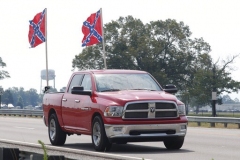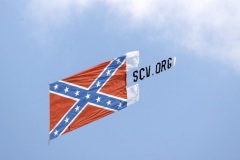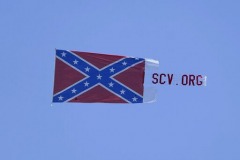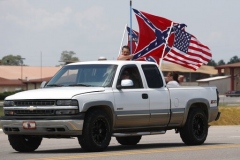On June 10th, 2020, the National Association for Stock Car Auto Racing (NASCAR) banned the display of the Confederate flag from all tracks and events (see official statement below). NASCAR, which draws much of its fanbase from the American south, received blowback from the decision, including the loss of sponsors, the loss of certain drivers, and unbridled criticism from many fans.
The decision to ban the flag followed a number of racially charged incidents in NASCAR, including the suspension of popular driver Kyle Larson for using a racial slur during an online racing event. Larson has since been reinstated.
Many fans disregarded the ban, claiming it was their First Amendment right to display the flag as a kind of symbolic speech. One organization, the Sons of Confederate Veterans, went so far as to do flyovers of multiple races after the ban, including a race in Bristol, Tennessee and Talladega, Alabama.
Justin Silverman, the executive director of the New England First Amendment Coalition, disagrees with the argument of a fan’s right to display the flag at NASCAR functions.
“It’s an important thing to note anytime you’re talking about the First Amendment,” Silverman said, “is that there needs to be a governmental actor. So if you have a private organization or private company like NASCAR making a decision to either restrict certain speech at their events, on their property… then there’s not likely a First Amendment implication.”
Audio: Justin Silverman, executive director of the New England First Amendment Coalition, speaks on First Amendment ramifications of NASCAR's Confederate flag ban
The flag’s display was also prohibited at any U.S. military installations by U.S. Secretary of Defense Mark Esper on July 17, 2020. The ban didn’t explicitly mention the Confederate flag, but it restricted display of flags to only banners that were associated with the current United States and military branches.
“Flags are powerful symbols, particularly in the military community for whom flags embody common mission, common histories, and the special, timeless bond of warriors,” Esper said. “The flags we fly must accord with the military imperatives of good order and discipline, treating all our people with dignity and respect, and rejecting divisive symbols.”
The restrictions were supported by Army General Mark Milley, chairman of the U.S. Joint Chiefs of Staff.
Milley also supports renaming the 10 military installations that are named for Confederate figures, despite pushback from President Donald Trump. Trump has claimed that the names on the bases (such as Fort Bragg in North Carolina) are supported by “most people.” He also spoke at length about how renaming the bases would be disrespectful and akin to canceling history.
Milley disagreed, arguing in a July testimony on Capitol Hill: “The American Civil War was fought — and it was an act of rebellion, it was an act of treason at the time — against the union, against the stars and stripes, against the U.S. Constitution, and those officers turned their back on their oath.”
The Confederate flag is not the only banner to become embroiled in controversy over recent times. The Thin Blue Line flag, a flag that pays respect to police officers, has appeared multiple times at far-right rallies and partisan functions. As such, it has been condemned by some as a symbol of police oppression of minorities. A primary maker of thin blue line merchandise, Thin Blue Line USA, has officially decried the flag’s use in any racist or bigoted manner. After a violent rally in Charlottesville, Virginia, the company said “We reject in the strongest possible terms any association of our flag with racism, hatred and bigotry. To use it in such a way tarnishes everything it and our nation stands for,” in a statement released on Facebook.



